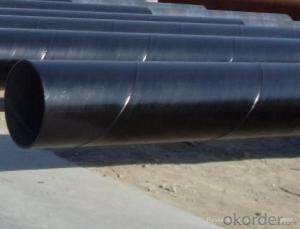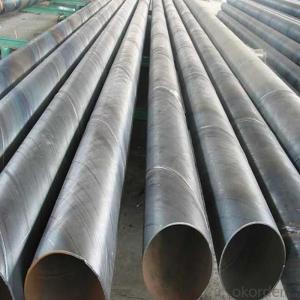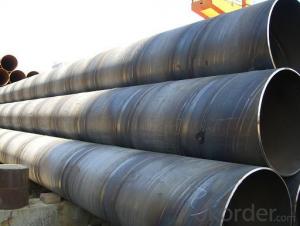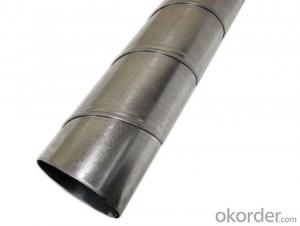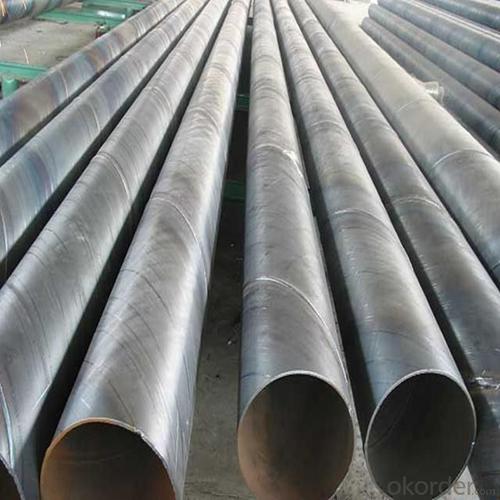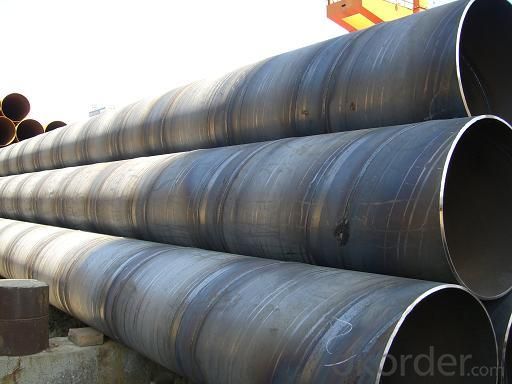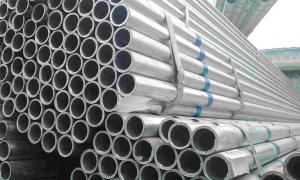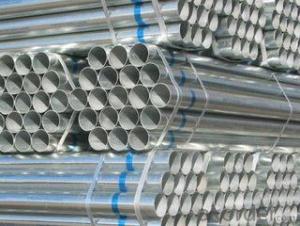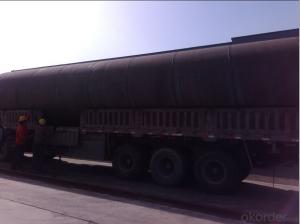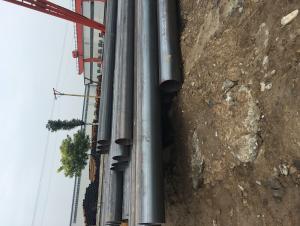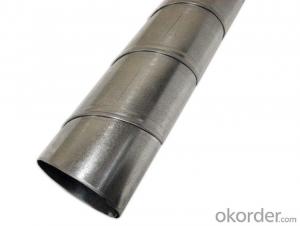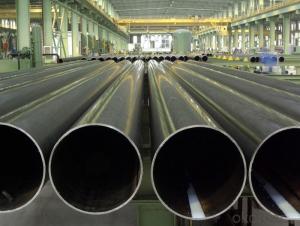SPIRAL CARBON STEEL PIPE ASTM A53 48''
- Loading Port:
- China Main Port
- Payment Terms:
- TT OR LC
- Min Order Qty:
- -
- Supply Capability:
- -
OKorder Service Pledge
OKorder Financial Service
You Might Also Like
Packaging & Delivery
Packaging Detail: | standard export packing or as customer's requirement |
Delivery Detail: | within 10 - 30 days |
Specifications
Spiral Welded Steel Pipes and Tubes
1.Material:Q195-Q235
2.Length:1-12m
3.WT:1.0-14mm
4.O.D.:20-273mm
Spiral Welded Steel Pipes and Tubes
Product Description:
1.Material : Q235,Q345,L245,L290,L360,L415,L450,L485,GrB,X42,46,X52,X56,X60,X65,X70,X80,X100
2,Standard: SY/T5037-2000,GB/T9711-2011,API Spec 5L PSL1/PSL2,ASTM A252\A53,ISO3183,DIN17172,EN10217,JIS G3457,AWWA C200,ASTM A139,ASTM A671,ASTM A672
3.Wall thickness: 3.0mm-30mm
4.Outer diameter: φ168mm-3020mm
5,Length: 5m-12m or as your requirement
6,Corrosion protection standard: DIN30670,DIN30671, AWWAC210, AWWA C203, SY/T0413-2002,SY/T0414-2002
7,Application: Oil, gas, natural gas, water pipe, thermal electricity pipe, steel structure engineering, etc
Q195-q345 Material Steel Pipe's Materials
Elements | Chemical Compsition% | Mechanical Property | ||||||
| C% | Mn% | S% | P% | Si% | Yield Point (Mpa) | Tensile Strength(Mpa) | Elongation |
Q195 | 0.06-0.12 | 0.25-0.50 | <0.050 | <0.045 | <0.030 | >195 | 315-430 | 32-33 |
Q215 | 0.09-0.15 | 0.25-0.55 | <0.05 | <0.045 | <0.030 | >215 | 335-450 | 26-31 |
Q235 | 0.12-0.20 | 0.30-0.70 | <0.045 | <0.045 | <0.030 | >235 | 375-500 | 24-26 |
Q345 | <0.20 | 1.0-1.6 | <0.040 | <0.040 | <0.55 | >345 | 470-630 | 21-22 |
- Q: Can steel pipes be used for architectural purposes?
- Yes, steel pipes can be used for architectural purposes. Steel pipes offer various advantages such as durability, strength, and versatility, making them suitable for architectural applications. They can be utilized in constructing building frames, staircases, handrails, and other structural elements. Additionally, steel pipes can be aesthetically pleasing when employed in modern and industrial designs, making them a popular choice for architectural purposes.
- Q: What are the different methods of pipe coating for steel pipes?
- There are several different methods of pipe coating for steel pipes, each with its own advantages and applications. One common method is fusion bonded epoxy (FBE) coating. This involves heating the steel pipe and applying a thermosetting powder that melts and adheres to the surface, creating a strong and durable coating. FBE coating provides excellent corrosion protection and is commonly used in the oil and gas industry. Another method is liquid epoxy coating. This involves applying a liquid epoxy resin to the surface of the steel pipe, which then cures and forms a protective barrier. Liquid epoxy coating is often used for smaller diameter pipes and provides good chemical resistance. Polyethylene (PE) coating is another popular method, particularly for pipelines that will be buried underground. PE coating involves wrapping the steel pipe with a layer of polyethylene, which provides excellent resistance to water, chemicals, and abrasion. Polyurethane (PU) coating is another option, offering a high level of chemical resistance and flexibility. It is typically used for offshore applications and in environments with extreme temperatures. Other methods of pipe coating include coal tar enamel (CTE) coating, which provides excellent resistance to water and chemicals, and concrete weight coating, which adds weight to the pipe to ensure stability in underwater or subsea applications. In summary, the different methods of pipe coating for steel pipes include fusion bonded epoxy (FBE), liquid epoxy, polyethylene (PE), polyurethane (PU), coal tar enamel (CTE), and concrete weight coating. The choice of coating method depends on the specific requirements of the application, such as corrosion protection, chemical resistance, or stability.
- Q: Can steel pipes be coated for additional protection?
- Yes, steel pipes can be coated for additional protection. Coating the pipes helps to prevent corrosion, enhance durability, and improve resistance to various environmental factors.
- Q: How do you join two steel pipes together without welding?
- One way to join two steel pipes together without welding is by using threaded connections. This involves screwing a threaded fitting onto each end of the pipes, creating a secure and durable connection. Additionally, other methods such as mechanical couplings or flanges can also be used to join steel pipes without welding. These methods provide a reliable and convenient alternative to welding for joining steel pipes together.
- Q: Can steel pipes be used for conveying sewage sludge?
- Yes, steel pipes can be used for conveying sewage sludge. Steel pipes have several properties that make them suitable for this purpose. Firstly, steel pipes are strong and durable, able to withstand the pressure and weight of sewage sludge without collapsing or breaking. This is important as sewage sludge can be heavy and contain solids that may put stress on the pipes. Secondly, steel pipes are resistant to corrosion, which is crucial when conveying sewage sludge that often contains corrosive elements. Corrosion-resistant steel pipes can ensure a longer lifespan and minimize the risk of leaks or damage. Additionally, steel pipes can be manufactured in various sizes and diameters, allowing for flexibility in designing sewage systems to meet specific requirements. However, it is important to note that proper maintenance and regular cleaning should be carried out to prevent the buildup of sludge and maintain the efficiency of the pipes.
- Q: How do you calculate the pressure drop in a steel pipe?
- To calculate the pressure drop in a steel pipe, you need to consider several factors such as the diameter and length of the pipe, the flow rate of the fluid, and the properties of the fluid itself. One commonly used equation to calculate the pressure drop in a pipe is the Darcy-Weisbach equation, which is given as: ΔP = (f * (L / D) * (ρ * V^2)) / (2 * D) Where: ΔP is the pressure drop in the pipe f is the Darcy friction factor, which depends on the pipe roughness and Reynolds number L is the length of the pipe D is the diameter of the pipe ρ is the density of the fluid V is the velocity of the fluid To calculate the Darcy friction factor, you can use different methods depending on the flow regime. For laminar flow, you can use the formula f = 16 / Re, where Re is the Reynolds number. For turbulent flow, there are several methods to determine the friction factor, such as the Colebrook equation or the Moody chart. It is important to note that the properties of the fluid, such as its viscosity and density, may vary with temperature and pressure. Therefore, it is necessary to consider these variations when calculating the pressure drop. Additionally, it is worth mentioning that there are other factors that can affect the pressure drop in a steel pipe, such as fittings, valves, and elbows. These factors introduce additional losses, which can be accounted for by using appropriate correction factors or by directly measuring the pressure drop across these components. Overall, calculating the pressure drop in a steel pipe involves using the appropriate equations, considering the properties of the fluid, and accounting for the various factors that may affect the flow. It is recommended to consult relevant engineering handbooks or utilize specialized software for accurate calculations.
- Q: Are steel pipes suitable for desalination plants?
- Yes, steel pipes are suitable for desalination plants. Steel pipes offer several advantages that make them a suitable choice for desalination plants. Firstly, steel pipes are highly resistant to corrosion, which is crucial in desalination plants where the presence of saltwater can be highly corrosive. The corrosion resistance of steel pipes ensures the longevity and durability of the infrastructure, reducing maintenance and replacement costs. Secondly, steel pipes have high strength and can withstand high-pressure conditions, which are often required in desalination plants. The ability of steel pipes to handle high-pressure water flow without any deformations or leaks ensures the efficient and reliable operation of the desalination process. Furthermore, steel pipes have excellent heat resistance properties, making them suitable for desalination plants that often involve heat-intensive processes such as distillation or reverse osmosis. Steel pipes can withstand high temperatures without any structural damage, ensuring the safe and efficient transfer of heated water or steam. In addition, steel pipes are readily available and have a wide range of sizes and specifications, allowing for flexibility in design and construction of desalination plants. This availability and versatility make steel pipes a cost-effective choice for desalination projects. Overall, due to their corrosion resistance, high strength, heat resistance, availability, and cost-effectiveness, steel pipes are highly suitable for desalination plants and are widely used in the industry.
- Q: How are steel pipes used in the construction of tunnels?
- Steel pipes are commonly used in the construction of tunnels to provide structural support, facilitate drainage systems, and carry various utilities such as water, gas, or electrical cables. These pipes are often installed as part of the tunnel's foundation or as a protective casing for the tunnel's infrastructure.
- Q: What is the role of steel pipes in the transportation of petroleum products?
- Steel pipes play a crucial role in the transportation of petroleum products. These pipes are specifically designed to withstand the high pressure and extreme temperatures associated with the transportation of oil and gas. One of the main roles of steel pipes in this process is to provide a reliable and secure conduit for the transportation of petroleum products over long distances. They are used to create pipelines that span hundreds or even thousands of miles, connecting oil fields, refineries, and distribution centers. Steel pipes are preferred for this purpose due to their strength, durability, and resistance to corrosion. The high tensile strength of steel allows these pipes to withstand the immense pressure exerted by the petroleum products as they flow through the pipelines. Additionally, steel pipes have the ability to withstand extreme temperatures, ensuring the safe transportation of hot crude oil or refined petroleum products. Furthermore, steel pipes are highly resistant to corrosion, which is a critical factor given the corrosive nature of petroleum products. The pipes are often coated with protective materials, such as epoxy or polyethylene, to further enhance their resistance to corrosion. This helps to prevent leaks or ruptures that could lead to environmental damage or safety hazards. Steel pipes also offer cost-effective and efficient transportation of petroleum products. They have a smooth interior surface, which reduces friction and allows for a more efficient flow of oil or gas. This, in turn, helps to minimize energy consumption and maximize the throughput of the pipeline system. In summary, the role of steel pipes in the transportation of petroleum products is to provide a reliable, secure, and efficient means of transporting oil and gas over long distances. They are designed to withstand high pressure, extreme temperatures, and corrosion, ensuring the safe and efficient delivery of petroleum products from production sites to refineries and distribution centers.
- Q: How do steel pipes handle chemical substances?
- Steel pipes are highly resistant to chemical substances due to their high strength and corrosion-resistant properties. They can safely handle a wide range of chemical substances without undergoing any significant degradation or damage.
Send your message to us
SPIRAL CARBON STEEL PIPE ASTM A53 48''
- Loading Port:
- China Main Port
- Payment Terms:
- TT OR LC
- Min Order Qty:
- -
- Supply Capability:
- -
OKorder Service Pledge
OKorder Financial Service
Similar products
Hot products
Hot Searches
Related keywords
